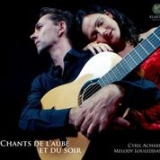 Chants de l'Aube et du Soir; Cyril Achard: Mélodies (Eve, Les Oiseaux, La Princesse sous Verre, L'Arche, La Petite Sirène, Au Couteau, L'Oignon, Dans la Chambre du Mort, Marie-Madeleine; Melody Louledjian, soprano, Cyril Achard, Gitarre; 1 Digital Release Klarthé KLA117; Aufnahme 09.2020, Veröffentlichung 03.2021 47') - Rezension von Norbert Tischer
Chants de l'Aube et du Soir; Cyril Achard: Mélodies (Eve, Les Oiseaux, La Princesse sous Verre, L'Arche, La Petite Sirène, Au Couteau, L'Oignon, Dans la Chambre du Mort, Marie-Madeleine; Melody Louledjian, soprano, Cyril Achard, Gitarre; 1 Digital Release Klarthé KLA117; Aufnahme 09.2020, Veröffentlichung 03.2021 47') - Rezension von Norbert Tischer

Ganz in der Tradition des französischen Kunstlieds hat der Gitarrist Cyrille Achard auf evokative Texte von Fabrice Hadjad eine Reihe von Liedern komponiert, in denen er die Tradition freilich mit heutigen Akzenten anreichert, u.a. denen der Chansonniers und des Jazz, der sein Hauptgebiet ist. Das gelingt ihm in einer ebenso individuellen wie stil- und geschmackvollen, eklektischen Art. Die ausgeglichene Koexistenz von Text und Musik war eines der wichtigsten Elemente für den Komponisten, was die Sängerin mit ihrer bestens artikulierenden Stimme honoriert. Poesie von Text und Musik kommen so vorzüglich zum Tragen und lassen das Programm sehr charmant werden.
Melody Louledji, oft auf der Opernbühne anzutreffen, hütet sich ebenfalls, die Lieder zu schwer werden zu lassen, ihnen jenes Pathos zu geben, mit dem so manche französische Liedsänger gesündigt haben. Ihre Stimme ist leicht, rund, oft keck, sie hat bezaubernde Farben und, wie gesagt, eine große Textverständlichkeit im Dienste der Texte und einer Musik, die ein insgesamt zartes und intimes Bild der Welt und des Alltags entwirft und sogar der Sterblichkeit mit Humor und Zärtlichkeit begegnet.
In the tradition of French art song, guitarist Cyrille Achard has composed a series of songs based on evocative texts by Fabrice Hadjad, in which he enriches the tradition with contemporary accents, including those of chansonniers and jazz, which is his main field. He succeeds in this in an eclectic way that is as individual as it is stylish and tasteful. The balanced coexistence of text and music was one of the most important elements for the composer, which the singer honors with her perfectly articulating voice. The poetry of text and music are thus excellently brought to bear and make the program very charming.
Melody Louledji, often seen on the opera stage, is also careful not to let the songs become too heavy, to give them that pathos with which so many French song singers did wrong. Her voice is light, round, often perky, it has enchanting colors and, as said, a great comprehensibility in the service of the texts and of a music that creates an altogether tender and intimate image of the world and of everyday life, and even meets mortality with humor and tenderness.






















